Nearly two-thirds of Chicagoans planning to cast a ballot in this month’s municipal election don’t feel personally safe from crime. And roughly the same number think the relationship between cops and the community is not a good one.
Those are some key takeaways from a new poll commissioned by the Chicago Sun-Times, WBEZ, Telemundo Chicago and NBC5. The survey also shows nearly half of voters are looking for the mayoral candidate who can best deal with the city’s endemic crime.
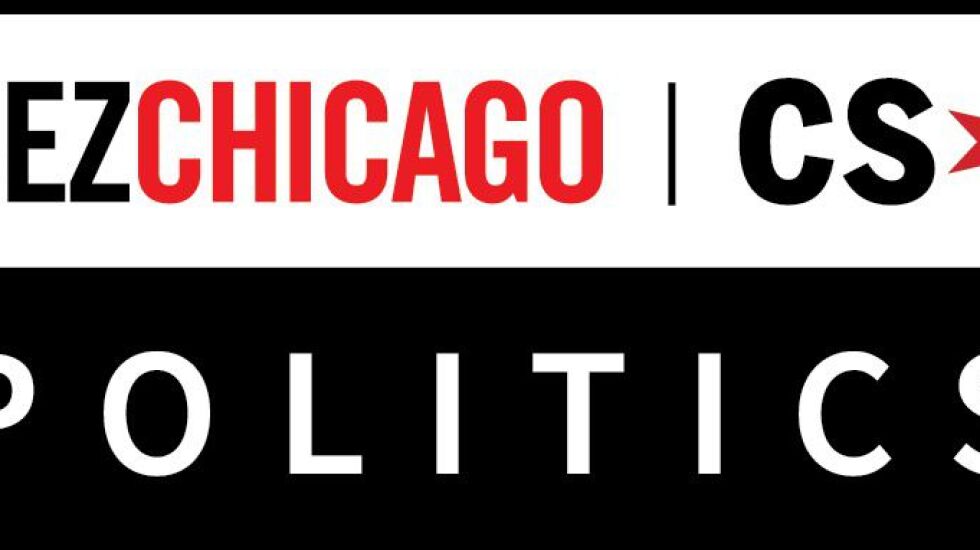
When asked to rank issues guiding their decision in the mayor’s race, 44% said crime and public safety were most important, distantly followed by criminal justice reform at 13% and the economy and jobs at 12%.
Even further down the list were education and immigration, both at 6%; city taxes and spending at 5%; housing and homelessness at 4%; public corruption at 3%, and drugs and transportation each at 2%. Just 1% of those polled cited public health as their key issue.
Men and women were equally concerned about crime, with 47% of men ranking it No. 1, and 42% of women. The racial breakdown of those prioritizing crime showed a more pronounced difference: 61% of white voters, 30% of Black voters and 37% of Hispanic voters.
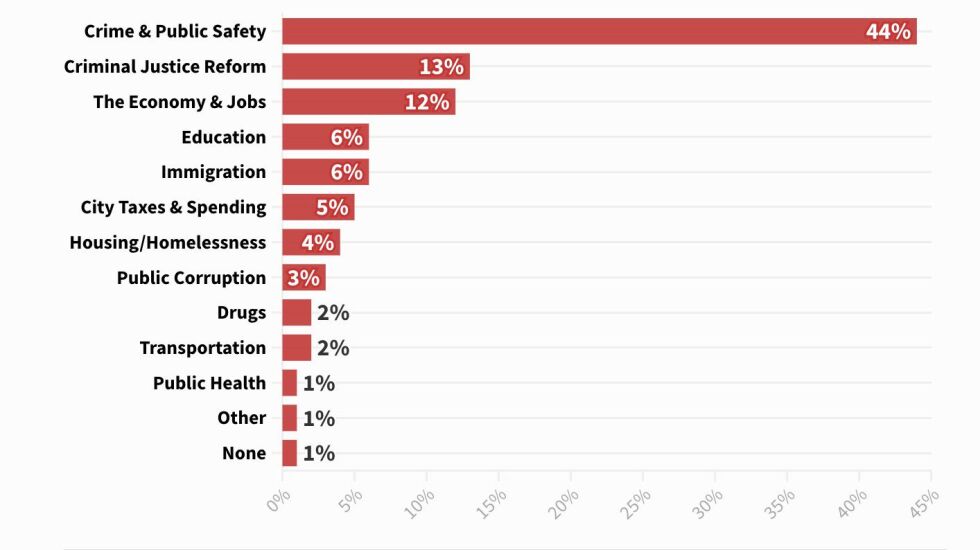
While gun violence is down this year compared to last, Chicago ended 2022 with 697 murders and saw its most violent year in a quarter-century in 2021. But zooming back further, data show the city is just slightly above the average number of murders per year over the last six decades.
Chicagoans are also worried about crime other than gun violence, including theft, robberies and carjackings, as incidents have crept into areas of the city unaccustomed to high rates of crimes.
Experts say it’s no surprise voters have crime on their minds.
“This city [crime rate] is still high, but COVID, social unrest has gotten the whole country, including rural white areas, up [in] violence significantly,” said Teny Gross, executive director of the Institute for Nonviolence Chicago, which employs dozens of former gang members on the South and West sides.
“But all of us live our lives locally. And in Chicago, the stories of carjackings and other things have created both justifiable fear and also, some places, hype.”
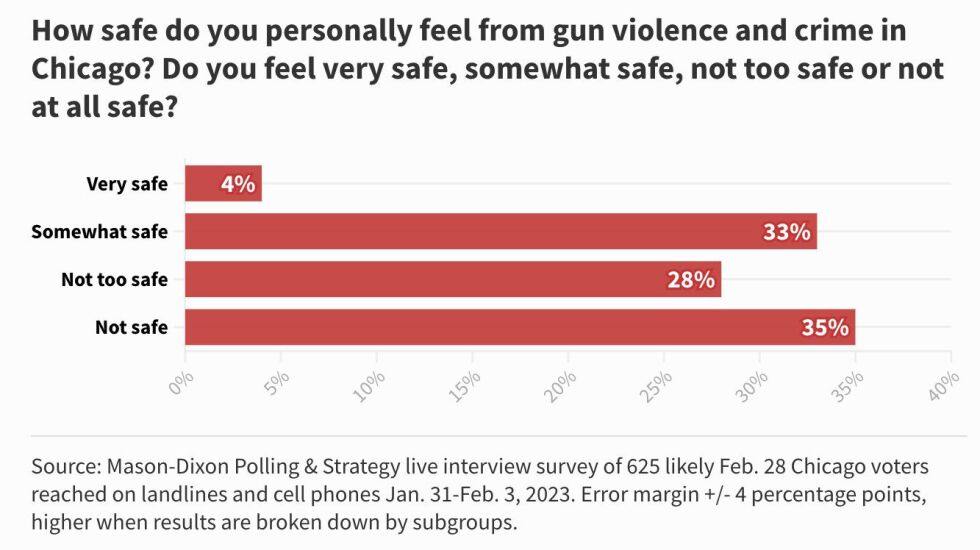
Whatever the reason, a whopping 63% of Chicagoans don’t feel safe, according to the poll. That jumps to 84% for African Americans and drops to 56% for Latinos and 49% for white residents.
Pollsters with Mason-Dixon Polling & Strategy, Inc. conducted the live phone interviews with 625 residents who were randomly selected from a city voter registration list. Surveyed Jan. 31 through Feb. 3, the respondents all said they were “likely to vote” in the Feb. 28 election. The margin of error is plus or minus 4 percentage points.
The overall breakdown of those surveyed was 36% white, 30% Black, 27% Latino, and 3% Asian.
As for how to solve the city’s crime problem?
Providing job training and economic opportunities was chosen as the most effective way to reduce crime, even more than hiring police officers.
Crime on the stump
Most of the nine mayoral candidates have been working hard to tap into the concerns over crime, which has taken center stage at nearly every candidate forum or debate. Businessman Willie Wilson and former CPS CEO Paul Vallas in particular are running tough-on-crime campaigns aiming to galvanize voters casting their ballot on that issue alone.
“Crime is out of control,” Vallas says to viewers in one TV commercial.
Those ads resonate, said one poll respondent who identified himself as David, 51. Crime is driving his vote after he suffered an attempted carjacking in his South Side neighborhood a few months back, he said.

“I feel that crime here is terrible. And something needs to be done about it,” he said. “If you’re not safe to come out of your own home, and go to work … I mean, that’s a serious problem.”
The 51-year-old truck driver said while every candidate is talking about how to control crime, he thinks Vallas “would be a good fit for being a mayor right now at this point.”
Graziano Pinna, an associate professor of psychiatry at the University of Illinois at Chicago who was surveyed, said he will not be voting to reelect incumbent Mayor Lori Lightfoot. He said crime has taken a toll on the city’s residents and has created a plethora of stress-related mental conditions.
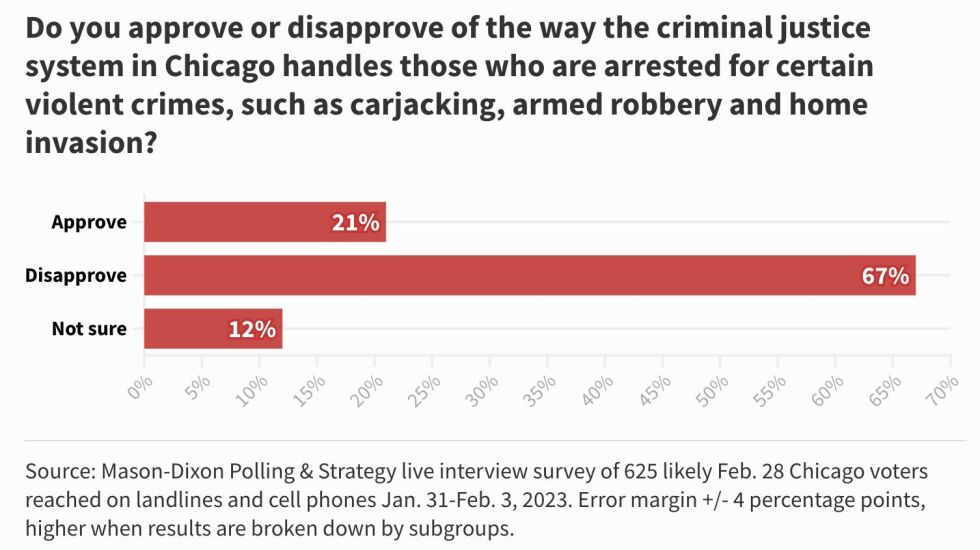
“My perspective is that we are going right now in the wrong direction when it comes to feeling safe, because of the huge amount of criminality,” Pinna said, adding that his car was stolen from in front of his home in late December.
“Sometimes we are so fearful about where we are going [when we travel] while the worst risk is at home,” he said.
WBEZ and the Sun-Times reported Wednesday that the poll showed Lightfoot’s reelection prospects are uncertain. The results show U.S Rep. Jesus “Chuy” Garcia leading with 20%, followed by Vallas with 18% and Lightfoot with 17% — a statistical dead heat because their numbers fall within the survey’s margin of error.
The survey showed Lightfoot’s chances of winning a runoff against either Garcia or Vallas were slim.
Jobs over jails
Chicago voters were split on how to reduce crime — but their top answer was jobs.
Chicago resident Stephanie Hunter, a budget manager for a university, said she’s casting her ballot for Cook County Commissioner Brandon Johnson because she believes he’ll address some of the root causes of violence, such as a lack of opportunity for residents.
“If we want to actually reduce crime, we need to increase the economic opportunities and the neighborhoods that need it most,” Hunter said. “Because all the policing in the world isn’t going to stop crime, it is just going to attempt to catch it, which the statistics show it’s not very good at doing.”
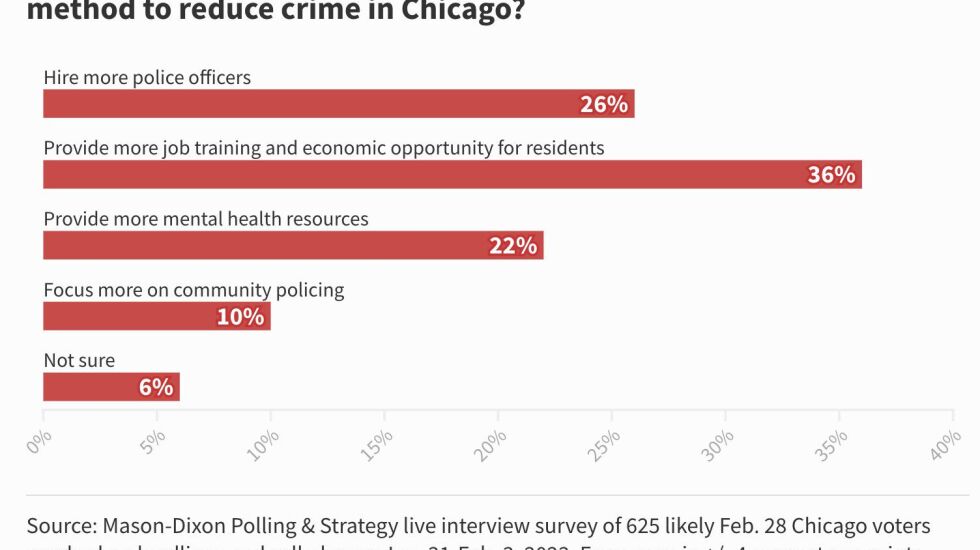
When poll takers were asked about ways to reduce crime, 36% chose providing job training and economic opportunity for residents as their top solution. Another 26% said hiring more police officers would help stem crime — and 22% said providing more mental health resources was the answer. Another 10% listed community policing as a solution.
Gross, with the Institute for Nonviolence Chicago, said the fact that Chicagoans listed job opportunities as the most effective method for reducing crime is a positive sign.
“It means that different parts of the city are listening to what Black and brown communities are saying and asking for,” he said. “So that maybe feels like a bit of room for optimism and some solidarity among Chicagoans.”
Crime through the prism of race
Many of the opinions on crime differed depending on the race of the voters surveyed.
Overall, 65% of all respondents felt relations between local law enforcement officers and the community were generally negative.
As high as that number is, it’s sharply higher among Black residents, with 85% — more than four out of five — calling police relations negative. Among Hispanic voters, 63% found relations with police negative, and among white voters, 49%.
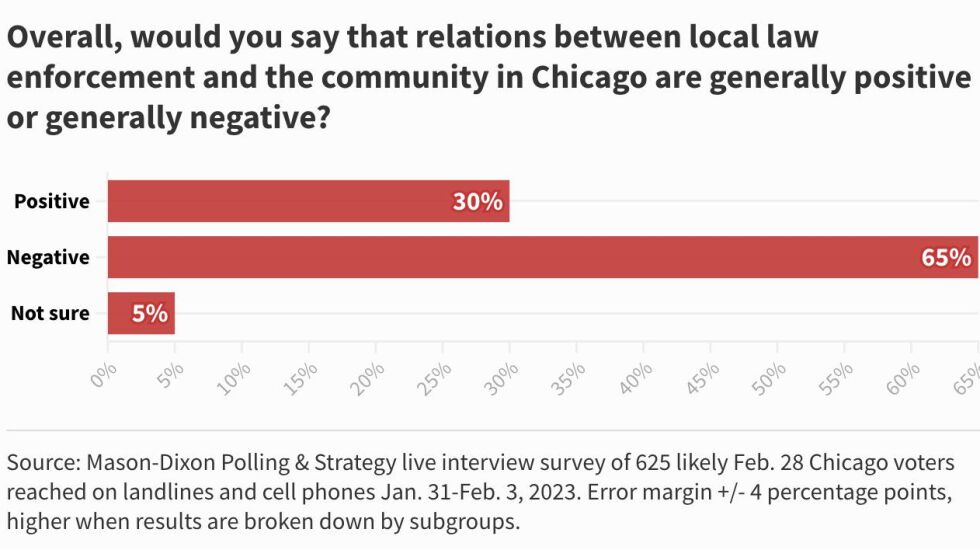
Black and white voters differed considerably in their opinions on reducing crime and fixing the criminal justice system.
Broken down by race, 31% of Black voters listed criminal justice reform as their top issue, with 30% more concerned about crime and public safety. Among white voters, criminal justice reform fell to the bottom of the list, with just 4% naming it their most important issue. At the top of their list was crime and public safety, chosen by 61% of white respondents.
Asked specifically which of the two was more important, 58% of all voters thought reducing crime should have a higher priority than criminal justice reform, compared to 37% of Chicagoans who want to prioritize reforming the system. The opinions were more evenly split among Black residents — 53% to 46%, respectively.
‘A monster that ‘just doesn’t get any smaller’
Some voters argue reform leads to less crime.
Ralph Dunbar is a retired maintenance worker who now volunteers with an anti-recidivism group. He said reforming the criminal justice system, including providing more resources for people returning from jail or prison, will have a domino effect of reducing crime.
“[The criminal justice system] is a monster, it just doesn’t get any smaller, it just gets bigger and bigger. And the food that this monster is eating are people. And it’s not just the people — it’s their families, their loved ones, it’s communities,” Dunbar said.
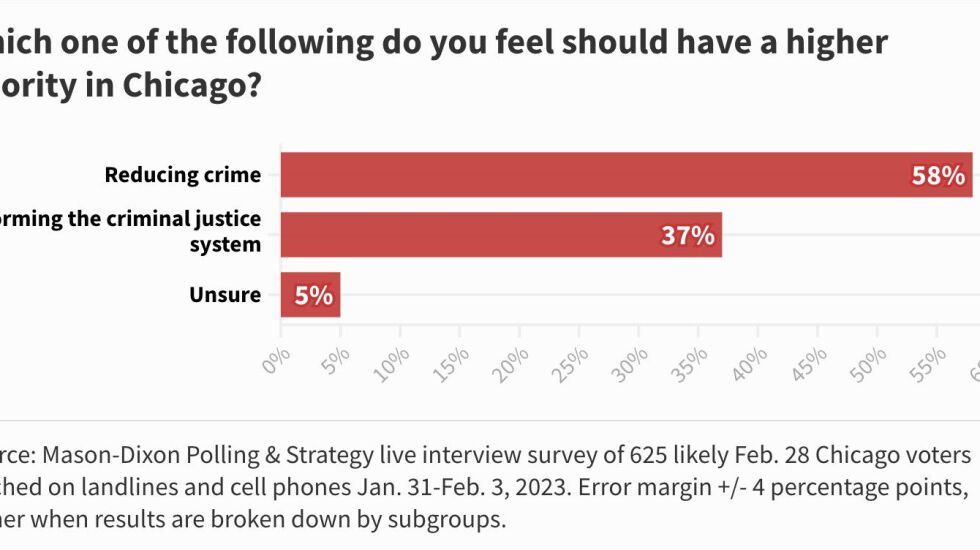
Dunbar isn’t excited about voting for Lightfoot, but said he plans to do so, characterizing a vote for the mayor as the lesser of multiple evils. He doesn’t believe Lightfoot has kept all of her promises, but he’d rather not take a chance on someone else who could also renege on theirs.
“The city ain’t burning down completely. And we are moving forward. So rather than just … trying to figure out somebody else and give them a mere chance to get used to it, I’ll just stick with her,” he said.
Of those polled, 67% said they didn’t approve of the way the criminal justice system in Chicago handles those who are arrested for certain violent crimes, such as carjacking, armed robbery and home invasion.
Lightfoot has repeatedly blamed Cook County Chief Judge Tim Evans and State’s Attorney Kim Foxx for the city’s crime rate, claiming without citing significant evidence that violent crimes are often committed by reoffenders who were let out on bail.
Still, Stephanie Coleman, 74, said she appreciates the way Lightfoot has confronted the issue head on.
“From what I understand, a lot of these people that are out here committing the crimes are people that have done something before, and they got a slap on the wrist or ankle bracelet and they get right out. They do the same thing all over again. Why can’t they keep them in jail?”
Mariah Woelfel covers city government and politics for WBEZ. Tina Sfondeles is the Chicago Sun-Times chief political reporter.







